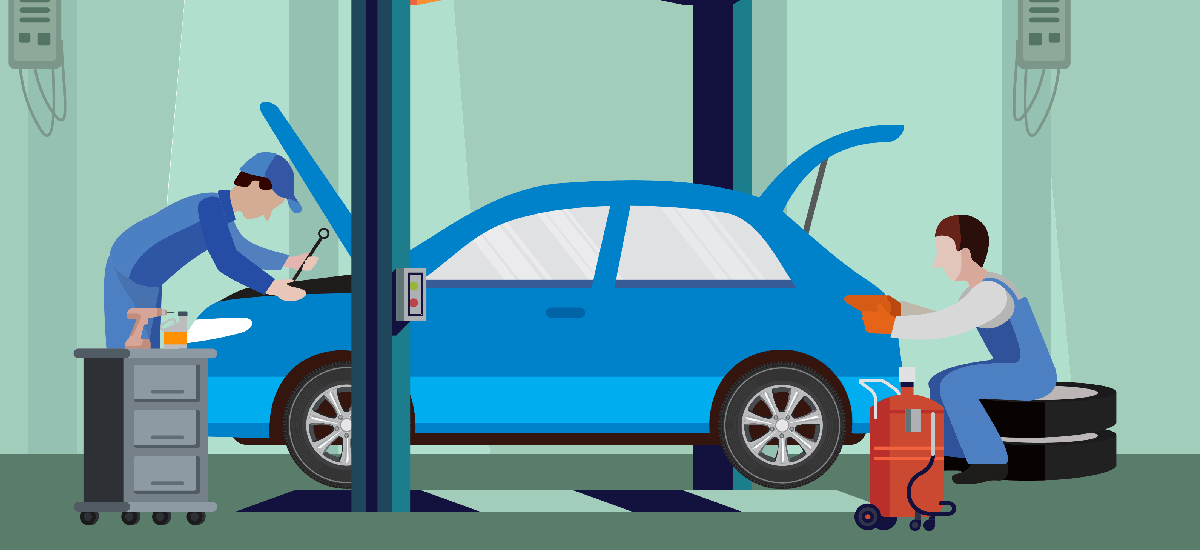All Categories
Featured
Your car depends on different liquids to keep its parts running smoothly and successfully. Overlooking these liquids can bring about reduced efficiency, potential security risks, and expensive repairs. Recognizing the function of each fluid and remaining proactive in maintenance guarantees your vehicle runs at its ideal. This article checks out the key car liquids and their value to your vehicle's health.
![]()
Why It Issues: Without proper lubrication, engine parts can grind against each other, leading to considerable damage. Upkeep Tips: Inspect your oil level regular monthly utilizing the dipstick and round off if required. Change the oil and filter according to your car's service schedule, commonly every 3,000 to 7,500 miles depending upon the oil kind and driving problems. 2. Coolant: Managing Engine Temperature Level. Coolant, likewise called antifreeze, helps maintain your engine's temperature within the optimum range. It stops overheating throughout heat and freezing throughout cold problems.
Why It Matters: Abject or insufficient coolant can result in engine getting too hot, which can cause serious damage. Upkeep Tips: Examine the coolant reservoir consistently and look for leakages or staining. Flush and re-fill coolant as advised, generally every 2 to 5 years. 3. Brake Liquid: Reliable Ending Power. Brake liquid is important for your automobile's stopping system, moving the force from your foot on the brake pedal to the brakes themselves. With time, brake liquid can take in moisture, which lowers its performance.
Why It Issues: A compromised stopping system can drastically influence your safety and security. Upkeep Tips: Inspect the brake fluid storage tank and make sure the level stays within this array. Adjustment the fluid every a couple of years or as required. 4. Transmission Fluid: Smooth Gear Shifts. Transmission liquid lubes the transmission parts and makes sure seamless equipment changes. It additionally prevents getting too hot by cooling down the system.
![]()
Why It Matters: Neglected transmission fluid can bring about gear slippage, getting too hot, or perhaps total transmission failing. Upkeep Tips: Display the fluid's degree and condition regularly. Replace it according to the producer's referrals, commonly every 30,000 to 60,000 miles. 5. Power Guiding Fluid: Simple And Easy Handling. Power guiding fluid assists in exact and smooth steering. Low or infected fluid can make guiding more hard, placing pressure on the system.
Why It Matters: Poor guiding responsiveness can compromise your control over the automobile. Maintenance Tips: Frequently examine the fluid degree and color, and leading it off as required. Listen to leakages or uncommon steering noises. 6. Windscreen Washer Liquid: Clear Visibility. While it doesn't influence performance, windscreen washer fluid is vital for maintaining presence, particularly in negative problems.
![]()
Why It Issues: A tidy windshield guarantees you can see plainly, reducing the risk of accidents. Upkeep Tips: Refill the washer fluid tank often and use a formula fit to your climate to avoid cold or streaking. Why Normal Fluid Upkeep is Crucial. Ideal Efficiency: Correct fluid degrees and high quality make sure all systems operate smoothly. Safety Assurance: Brake and power steering fluids straight influence your capacity to regulate the car. Expense Financial savings: Preventative upkeep stays clear of pricey repair services by capturing possible issues early. Durability: Liquids in excellent condition aid extend the life of critical elements, including the engine and transmission. Quick Tips for Effective Fluid Upkeep. Adhere to the Manual: Refer to your car's owner guidebook for details upkeep intervals. Look Out for Leaks: Pools under your vehicle can suggest liquid leakages that require prompt focus. Usage Recommended Products: Adhere to fluids suggested by your car producer to stay clear of compatibility concerns. Focus On Caution Signs: Dashboard alerts or unusual performance can indicate liquid troubles. Verdict. Maintaining your automobile's liquids is just one of the easiest methods to keep it running successfully and securely. Whether it's engine oil, coolant, or brake liquid, each plays a crucial function in your automobile's overall wellness. Regular checks, combined with prompt replacements, can avoid malfunctions, improve performance, and extend the life of your vehicle. Keep proactive, and you'll delight in a smoother and more secure driving experience for several years to find.

- Engine Oil: The Lifeline of Your Engine. Engine oil plays a crucial function in lubricating the engine's moving parts, decreasing rubbing, and securing against wear and overheating. With time, oil degrades or ends up being contaminated with particles, which can jeopardize its efficiency.
Why It Issues: Without proper lubrication, engine parts can grind against each other, leading to considerable damage. Upkeep Tips: Inspect your oil level regular monthly utilizing the dipstick and round off if required. Change the oil and filter according to your car's service schedule, commonly every 3,000 to 7,500 miles depending upon the oil kind and driving problems. 2. Coolant: Managing Engine Temperature Level. Coolant, likewise called antifreeze, helps maintain your engine's temperature within the optimum range. It stops overheating throughout heat and freezing throughout cold problems.
Why It Matters: Abject or insufficient coolant can result in engine getting too hot, which can cause serious damage. Upkeep Tips: Examine the coolant reservoir consistently and look for leakages or staining. Flush and re-fill coolant as advised, generally every 2 to 5 years. 3. Brake Liquid: Reliable Ending Power. Brake liquid is important for your automobile's stopping system, moving the force from your foot on the brake pedal to the brakes themselves. With time, brake liquid can take in moisture, which lowers its performance.
Why It Issues: A compromised stopping system can drastically influence your safety and security. Upkeep Tips: Inspect the brake fluid storage tank and make sure the level stays within this array. Adjustment the fluid every a couple of years or as required. 4. Transmission Fluid: Smooth Gear Shifts. Transmission liquid lubes the transmission parts and makes sure seamless equipment changes. It additionally prevents getting too hot by cooling down the system.

Why It Matters: Neglected transmission fluid can bring about gear slippage, getting too hot, or perhaps total transmission failing. Upkeep Tips: Display the fluid's degree and condition regularly. Replace it according to the producer's referrals, commonly every 30,000 to 60,000 miles. 5. Power Guiding Fluid: Simple And Easy Handling. Power guiding fluid assists in exact and smooth steering. Low or infected fluid can make guiding more hard, placing pressure on the system.
Why It Matters: Poor guiding responsiveness can compromise your control over the automobile. Maintenance Tips: Frequently examine the fluid degree and color, and leading it off as required. Listen to leakages or uncommon steering noises. 6. Windscreen Washer Liquid: Clear Visibility. While it doesn't influence performance, windscreen washer fluid is vital for maintaining presence, particularly in negative problems.

Why It Issues: A tidy windshield guarantees you can see plainly, reducing the risk of accidents. Upkeep Tips: Refill the washer fluid tank often and use a formula fit to your climate to avoid cold or streaking. Why Normal Fluid Upkeep is Crucial. Ideal Efficiency: Correct fluid degrees and high quality make sure all systems operate smoothly. Safety Assurance: Brake and power steering fluids straight influence your capacity to regulate the car. Expense Financial savings: Preventative upkeep stays clear of pricey repair services by capturing possible issues early. Durability: Liquids in excellent condition aid extend the life of critical elements, including the engine and transmission. Quick Tips for Effective Fluid Upkeep. Adhere to the Manual: Refer to your car's owner guidebook for details upkeep intervals. Look Out for Leaks: Pools under your vehicle can suggest liquid leakages that require prompt focus. Usage Recommended Products: Adhere to fluids suggested by your car producer to stay clear of compatibility concerns. Focus On Caution Signs: Dashboard alerts or unusual performance can indicate liquid troubles. Verdict. Maintaining your automobile's liquids is just one of the easiest methods to keep it running successfully and securely. Whether it's engine oil, coolant, or brake liquid, each plays a crucial function in your automobile's overall wellness. Regular checks, combined with prompt replacements, can avoid malfunctions, improve performance, and extend the life of your vehicle. Keep proactive, and you'll delight in a smoother and more secure driving experience for several years to find.
Latest Posts
Discover Cut Costs on Car Maintenance with Montclare Auto Repair’s Special Deals
Published en
1 min read
Uncover Outstanding Car Repair Services from Montclare Auto Repair – Quality Service Today
Published en
1 min read
Explore WyHy Federal Credit Union – Key Solutions for Your Money Goals
Published en
1 min read
More
Latest Posts
Discover Cut Costs on Car Maintenance with Montclare Auto Repair’s Special Deals
Published May 25, 25
1 min read
Uncover Outstanding Car Repair Services from Montclare Auto Repair – Quality Service Today
Published May 24, 25
1 min read
Explore WyHy Federal Credit Union – Key Solutions for Your Money Goals
Published May 23, 25
1 min read